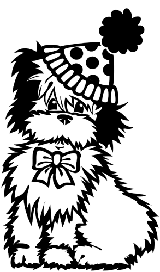Grooming DogsSpecial Care For Grooming Sensitive Dog Skin: Part 2 |
|
|
Your dog's skin is one of his most sensitive and easily damaged organs. If he develops a skin problem such as an allergy or a negative reaction to grooming products, his skin can initiate a cycle of other conditions that can be difficult to cure. Some breeds in particular have very sensitive skin that would require special care and handling. For example, if your dog has a white or light-colored coat and pink skin, he may be more sensitive to just about everything, from dry air and sun, to irritation from grooming products. In addition, dogs with short coats are more likely to have reactions to certain products. Other examples of skin disorders that can result from improper grooming are as follows: Hot Spots: Hot spots are moist, hot wound-like areas that develop rapidly and can be very painful. This type of skin problem may be caused by a variety of triggers such as fleas, allergies, irritants, infections, or lack of proper grooming. Hot spots build up and grow because the dog compulsively licks and scratches at the itchy, painful spots, making it increasingly worse until it becomes infected. Vets have to treat hot spots by clipping hair away to disinfect and treat the area. The dog will probably be treated for itching and may have to wear an "Elizabethan collar'' in order to prevent the hot spots from becoming irritated while it heals. Product Reactions: Some breeds are sensitive to certain products like shampoos, conditioners, coat sprays, or flea or tick control. If your dog has an inexplicable skin reaction, check if you have recently changed grooming products or food. If your dog has sensitive skin, you may want to try mild, hypoallergenic, and/or natural products containing skin-soothing ingredients. If you are not sure of which product to get, ask a vet for recommendation.Skin Diseases: Dogs can develop many different skin diseases, some inherited, some caused by environmental factors. Your vet should always address skin diseases in your dog and can advise you how to properly groom them. Whether relatively minor but inconvenient, such as greasy, scaly skin resulting from overactive sebaceous glands (called oily seborrhea), something cosmetic, like a disease that causes hair loss (like color mutant alopecia), or something potentially life-threatening, like skin cancer, skin disease in dogs must be treated immediately. Skin Infections: Skin infections can be caused by bacteria introduced into a wound, either by unsanitary conditions, or by poor grooming. From impetigo, which is common in puppies, skin-fold pyoderma which is common in loose-skinned breeds like Chinese Sharpei, to abscesses of uncertain origin, skin infections should be treated with antibiotics, which your vet can prescribe. Never groom over an infected area. Hair should be cut or carefully clipped from the area in order for the infection can heal. Back to the Special Care For Grooming Sensitive Dog Skin: Part 1 page Back to the Dog Grooming page
| |
|
Related News About Dogs ' ); // get rid of newsfeed display by carp CarpConf('poweredby',''); CarpCacheShow('http://shopping.msn.com/xml/xmlresults/shp/?bCatId=6826,format=rss'); ?>
|
|
|
|
|
|
Copyright © 2006-2007 dogguidance.com |


